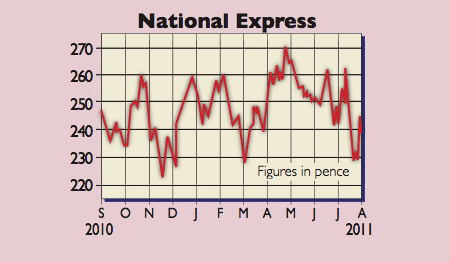
The transport secretary, Philip Hammond, recently announced train fare hikes of 8% on average from January, as calculated from an agreed formula for the industry of 3% above the retail price index. He said these price rises were “vital” to cut the government’s £4bn per year subsidy and boost investment in Britain’s rail system. That’s bad news for commuters, but a boon for transport operators such as National Express. It runs bus, coach and rail passenger services in Britain (42% of profits), North America (28%) and Spain (30%).
In Britain, the firm is the leader in the West Midlands bus sector and boasts a 60% share of the country’s scheduled coach market. It also operates two rail franchises in the east of England, which should benefit from higher prices and lower diesel costs. But the company’s CEO, Dean Finch, also believes “there is evidence that the recession is encouraging passengers to seek more cost-effective modes of transport”. Indeed, its cheaper coach operations are already winning over drivers and punters from air and rail services. The new commuter route from Kent to Canary Wharf is proving popular and excellent ticket sales were achieved during the royal wedding in April. With passenger yields improving, much of this extra income should fall to the bottom line.
The trans-national (Eurolines) unit is also doing well and was largely sold out over Easter. On the Paris and Amsterdam routes, extra capacity in the peak season saw jumps of 44% and 24% in June. Eurolines has also secured a contract with Eurotunnel to bring an estimated 18,000 passengers to the London Olympics in 2012. Profits also rose in Spain and America as consumers and students opted for buses. The company enjoys multi-year student concessions, and retention rates in America reached an impressive 98% in the first half, with further expansion expected in the second half as new schools sign up. Other countries (such as Germany) are liberalising their public transport services, offering more overseas opportunities further down the road.
National Express (LSE: NEX), rated a BUY by Oriel Securities
The City is anticipating 2011 turnover and underlying earnings per share (EPS) of £2.1bn and 27.1p respectively, alongside a 9.4p dividend (that’s a 4% yield). On this basis, and given its counter-cyclical qualities, I rate the group on a ten-times operating profit multiple. Adjusting for £635m of net debt (1.9 times EBITDA), that delivers an intrinsic worth of roughly 310p a share.
What about possible roadblocks? Well, the whole British rail franchising process can be fraught – the company had to hand back the East Coast line to the government in 2009. Foreign-exchange fluctuations, oil-price hikes (oil is about 15% of costs), political interference and reducing government grants for fuel and concessionary fares are also potential risks.
Yet with the stock trading on a paltry p/e ratio of 8.5, this seems a good time to hop on board. I suspect the entire sector could see mergers and acquisitions activity over the next few years, with National Express becoming a tasty target. The next trading update is due out on 1 November. Oriel has a target price of 300p.